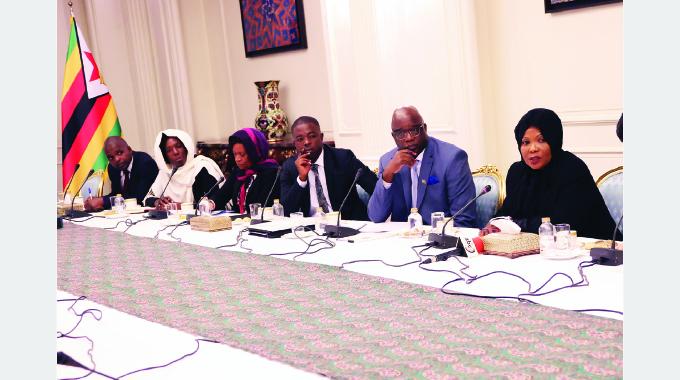
Africa-Press – Zimbabwe. First Lady Dr Auxillia Mnangagwa delivers her presentation while flanked by delegates from different ministries in Zimbabwe during a meeting with presidents of top Iranian Universities in Tehran, Iran on Sunday.
SCORES of Iranian top universities have offered exchange programmes with Zimbabwe’s institutions of higher learning and scholarships in various fields to academically gifted students from humble backgrounds through First Lady Dr Auxillia Mnangagwa’s Angel of Hope Foundation in appreciation of her efforts to empower the country’s citizenry through education.
The offer was made at a colourful ceremony attended by presidents of Iranian universities who gathered to meet Dr Mnangagwa, who has captured the imagination of the world by creating life-changing opportunities for vulnerable groups.
Dr Mnangagwa, who has a passion for the empowerment of people especially the girl child through education, is in Iran at the invitation of the country’s First Lady, Dr Jamileh Alamolhoda.
During the meeting, the universities expressed preparedness to expand cooperation with Zimbabwe through technology and technical knowledge transfer.
Impressed by the work being done by Dr Mnangagwa in Zimbabwe, they offered to partner her foundation through providing scholarships for vulnerable children so that they further their studies.
Education is at the heart of Dr Mnangagwa who through her foundation pays school fees for scores of underprivileged children and provides uniforms for them. She also mobilises stationery and other sundries for the learners.
Dr Mnangagwa runs a school feeding programme to ensure no child pulls out of school because of hunger.
The First Lady’s Angel of Hope Foundation also has a partnership with Zimbabwe Open University (ZOU) which offers life-changing short courses to thousands of Zimbabweans especially women and the girl child.
Amai Mnangagwa has also made it possible for children from humble backgrounds to attain university education through scholarships at universities across the globe.
In her remarks, the First Lady expressed gratitude for the assistance she had been offered in her efforts to empower the nation through education.
“I want to thank the universities that have offered scholarships to my Angel of Hope Foundation and I accept the kind gesture. Under the Angel of Hope Foundation, I look after vulnerable children some who are bright in school but cannot proceed with education due to financial challenges. Some are from child-headed families after having lost their parents hence no-one to pay school fees for them,” she said.
Dr Mnangagwa acknowledged that since Zimbabwe and Iran were under sanctions, they had a lot to learn from each other.
“In Zimbabwe we are under sanctions which you also have here in Iran. We want the two countries to be friends and to have ties which benefit the two countries because we are in the same situation. We have to be thinking outside the box so that we build our countries exchanging experiences,” she said.
She added, “We need to co-operate in areas that develop our two countries like agriculture, mining, energy and tourism. Iranian doctors recently visited our country and they worked together with our local doctors. We are grateful for that. The Minister of Health and Child Care who is also the Vice President of our country received them, met with them and gave them certificates at the end of their programme. That was very important for us a country.”
Amai Mnangagwa said Zimbabwe was strategically located in the Sadc region, because most nations pass through it, hence its suitability for development.
“Zimbabwe is centrally situated where it will also benefit other Sadc countries because all the routes, you go to Zambia via Zimbabwe, you go to Malawi via Zimbabwe, so the whole Sadc area will also benefit,” she said
She spoke about innovation hubs that are driving technological research and development at Zimbabwean universities.
“Coming to the education sector, we have also some innovation hubs in universities where students are allowed to go and practice what they are taught and come up with what they want to produce. The students have come up with so many ideas just like what is being done in universities here in Iran. All they have created, has come to be very useful in our country,”she said.
On mining, the First Lady said: “Our youths are working on the mines, but they have shortages of equipment and some do not have expertise of how to extract the minerals. From the presentations made by the universities, they are willing to do teacher, student exchange programmes that would help our youths gain experience on how to manufacture and operate equipment to boost their production efficiencies. Therefore, if we work together in that area, our youths and women will benefit a lot,” she said.
First Lady Dr Auxillia Mnangagwa delivers her presentation during a meeting with presidents of top Iranian Universities in Tehran, Iran on Sunday. — Pictures: John Manzongo
Mr Malcolm Mazemo, the Director for Strategic Policy Planning, Monitoring and Evaluation in the Ministry of Mines and Mining Development, who is part of the First Lady’s delegation, highlighted the need for knowledge exchange between Zimbabwe and Iran in the area of small scale mining for the benefit of youths.
He added that Zimbabwe needed equipment for small-scale miners to increase production.
“There is need for equipment to be supplied to small-scale miners who contribute significantly to gold production in the country. If our universities work together, our students will learn a lot and be able to use latest technologies to extract the minerals. Exchange programmes will go a long way in empowering our youths through knowledge and skills transfer,” he said.
Earlier, the Iranians had paid tribute to the First Lady for the work she is doing to preserve the country’s cultural norms and values and bettering the literacy of women.
“We have heard the great works that you are doing in your country to bettering the literacy situation of women in your country and also try to help them in order to be able to take care of themselves financially. I would like to extend my appreciation to your philanthropic work and for visiting Iran. Also, I would like to thank the presidents of universities that are here. I believe that this meeting can lead to identifying and detecting our potential in order to strengthen our exchanges in different areas of culture, society, trade and commerce. I would also like to appreciate the presence of
Mr Abbas Navazani, the ambassador of Islamic republic of Iran to the republic of Zimbabwe who is going to tell us about the relationship between the two countries and how the two countries can improve their relations,” said the vice president for Women and Family Affairs Ensieh Khazali.
In brief, the ambassador explained that the two countries enjoyed cordial relations which could further be strengthened.
Hossein Qenaati, the Dean of Tehran Medical University said his institution has a history of over 200 years in education research.
“I am the chancellor of the biggest and oldest university in Tehran but I am not responsible only for education and research, I am also responsible for the health system for the city of Tehran covering about 4 million people. We have a dedicated and innovative health system that we have a referral system of family physicians,” he said.
Mahmud Reza Aqamiri, Dean of Islamic Azad University of Tehran spoke about his interests to offer scholarships to Zimbabwean students through the Angel of hope Foundation.
He also expressed interest to partner Zimbabwean Universities and open a branch in Zimbabwe for the benefit of Zimbabwean students.
“We would like to work with Zimbabwean universities. We would like to develop different branches of our university in Zimbabwe. Already, the university has branches in Iraq, Afghanistan, Tajikistan, UAE and Britain. We want to increase the number of our branches in different countries and offer scholarships to the Zimbabwean community,” he said.
The same was said by Alireza Zali, Dean of Shahid Beheshti medical university who said they could provide for the launch of primary health care in Zimbabwe.
Mrs Masoumeh Malek, secretary-general of professor and non-Iranian students in Tehran university said Teheran University was known as a parent university with 21000 students out of which 800 were foreign students.
“There are three universities under Tehran University also known as free zones. Also pioneering a science and Technology Park to support developing countries believe in societal influence. We are ready to have joint cooperation, teacher and student engagement with Zimbabwe and grant scholarships,” she said.
For More News And Analysis About Zimbabwe Follow Africa-Press





